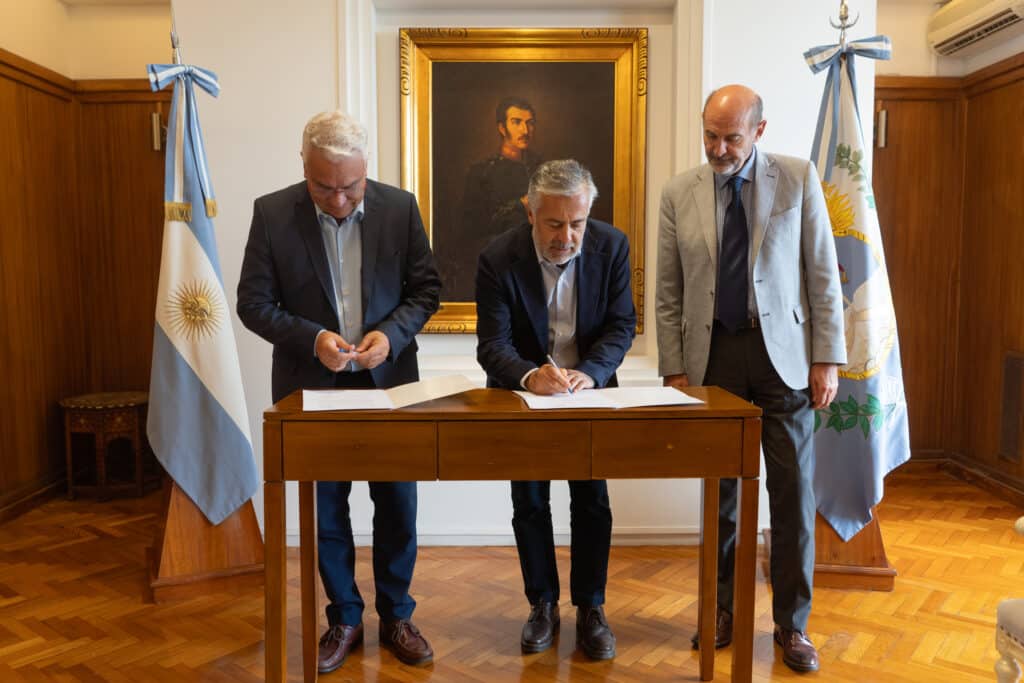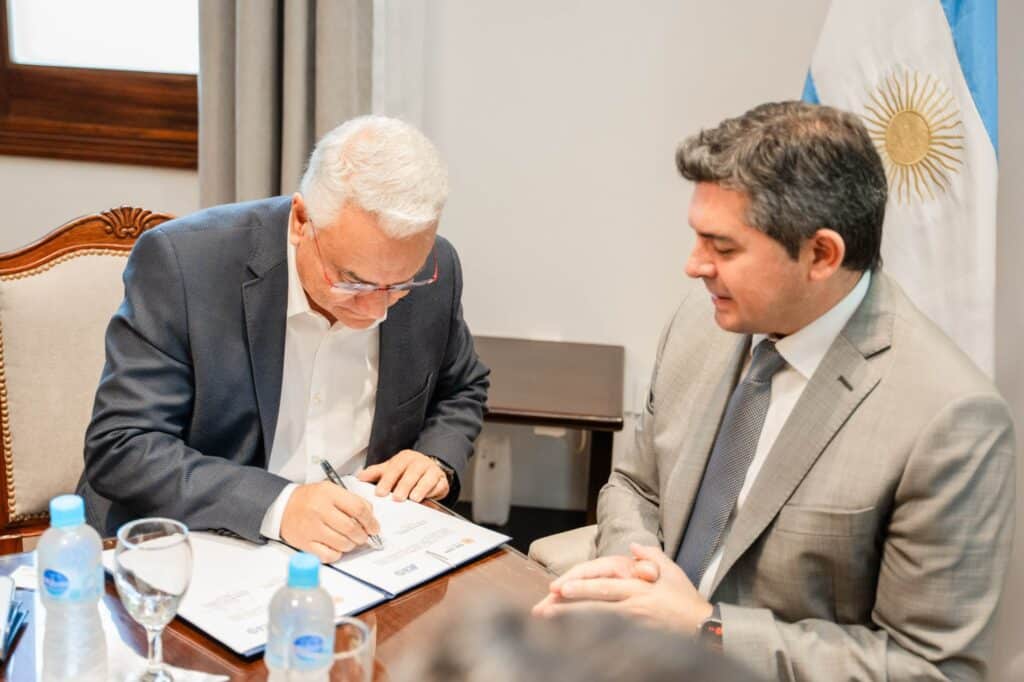
IICA’s cooperation project will be aligned with Mendoza’s provincial Master Plan for the Water Sector, which has established guidelines for the sustainable use of this natural resource, with projections up to 2050.
Mendoza and San Juan, Argentina, 25 March 2025 (IICA) – The Inter-American Institute for Cooperation on Agriculture (IICA) will lend support in boosting water management efficiency and upgrading the water infrastructure of Mendoza and San Juan, two Argentinian provinces whose arid climate necessitates the use of irrigation for almost all food production.
Alfredo Cornejo and Marcelo Orrego, the governors of Mendoza and San Juan, respectively, signed cooperation agreements with the IICA Representative in Argentina, Fernando Camargo, who visited them at their provincial government offices.

The agreements fall under IICA’s Hemispheric Initiative on Water and Agriculture , which is the Institute’s main cooperation mechanism to identify agriculture sector-based solutions to the global water crisis .
Camargo and some of the IICA Argentina team visited various production enterprises, water storage and irrigation systems, and spoke to farmers in these two provinces, which are located in the Andes Mountains in the western region of the country.
IICA’s cooperation project will be aligned with Mendoza’s provincial Master Plan for the Water Sector, which has established guidelines for the sustainable use of this natural resource, with projections up to 2050.
The production oasis under irrigation occupies only 4.8% of Mendoza’s land area, where 95% of the population and most economic activity is concentrated. Further development will be largely dependent on investment in water infrastructure, coupled with efficient water management measures.
Likewise, the irrigated oasis in San Juan is considered a vital and strategic resource that is essential for its environmental, social and economic growth and development. There have been intense droughts in the area over the last fifteen years, which have compounded the water crisis, making it necessary to design and implement an innovative water management and territorial development model.
The agreements fall under IICA’s Hemispheric Initiative on Water and Agriculture, which is the Institute’s main cooperation mechanism to identify agriculture sector-based solutions to the global water crisis .

IICA will assist in boosting water management efficiency and upgrading the water infrastructure of Mendoza and San Juan, Argentinian provinces whose food production depends almost exclusively on irrigation, due to the arid climate.
IICA Director General, Manuel Otero, launched the project in 2023, in a bid to build capacities and promote public-private strategic partnerships among member countries of the hemispheric organization to improve water management in agriculture, in support of the ministries and other organizations tasked with this portfolio.
Visit to rural areas
“The visit has allowed us to gather further details and information about the tools that IICA has at its disposal to strengthen these processes. It has given the IICA team first-hand insight into Mendoza’s agricultural infrastructure strategies. These include improvements in irrigation efficiency and the incorporation of new technologies for water reuse”, said the Undersecretary of Infrastructure and Territorial Development of the province, Marité Badui, who was one of the provincial officers participating in the signing of the agreement, along with Governor Cornejo.
In San Juan, Governor Orrego was joined by the Secretary of Agriculture, Livestock and Agroindustry, Miguel Moreno, and other officers, who stressed that the implementation and continuous improvement of the provincial Master Plan for Integrated Management of Water Resources requires support tools in technical areas, such as finance.

Fernando Camargo, IICA Representative, and Marcelo Orrego, Governor of San Juan, Argentina.
Camargo reflected that the agreements that IICA signed with San Juan and Mendoza would play an essential role in fostering rural retention, improving small farmers’ standard of living, enhancing crop diversity and increasing the resilience of crops to adverse weather conditions.
“We must consider how to make agriculture increasingly sustainable, by promoting low use of resources such as water and encouraging practices that prioritize soil health”, said Camargo.
Other IICA officers who accompanied the IICA Representative in Argentina on the visit to San Juan and Mendoza were Hombray Taylor, Coordinator of the Hemispheric Initiative on Water and Agriculture; the IICA Argentina Advisor in Institutional Relations, Juan Manuel Fernández Arocena; and Technical Coordinator, Carolina Pivetta.
More information:
Institutional Communication Division.
comunicacion.institucional@iica.int











